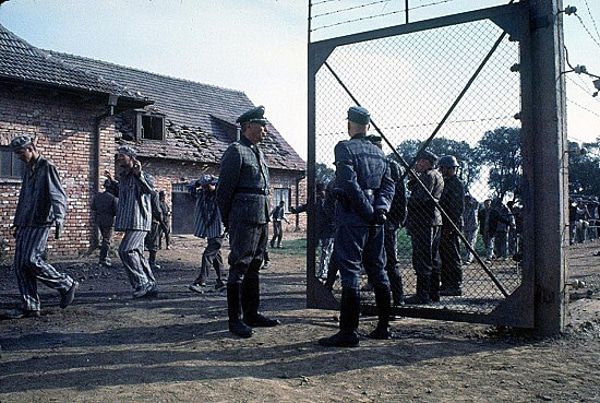Eye For Film >> Movies >> The Grey Zone (2001) Film Review
The Grey Zone
Reviewed by: Scott Macdonald

Just what are we prepared to do to survive? One of the central characters of The Grey Zone asks this central question of a person who cannot reply. Neither can the audience by this point. The film is a portrayal of the life of a unit of Auschwitz's Sonderkommando, several appointed Jews who avoid death in Hitler's Final Solution. They aid the army in the day-to-day tasks of running the mammoth crematoriums and gas chambers, and moving the dead. Ushering in truckloads of people to the chambers and unceremoniously disposing of their lifeless bodies. For this, they have special priveliges, like good food, vodka, clean linen, and as many as four months' more life.
The Grey Zone tells the story of an uprising, where Jews are stocking illicit explosives and weapons. Some of the kommandos fight amongst themselves to use this pile to try to escape, while others are more direct and practical. The other idea is to use explosives to destroy as many of the ovens as possible, and then die, taking as many of the soldiers as possible with them.

Normally, I'm quiet when I'm moved, but I loudly wept in anguish at moments in this film. There's a small substory about a guy who's selected from a group to join the kommandos. In the first lot of "cargo", he incinerates his wife, children and grandchildren - everything that proved that he existed is gone inside 20 minutes. I howled in rage, sorrow and empathetic agony. Almost unbearable. Nearly as terrible is a scene where a condemned man refuses to give up his valuable watch on his way to die. I was reeling at the film's intensity of performance.
The film has been directed by Tim Blake Nelson, adapted from his own stage play, and while there are plenty of clean lifts from the play his cinematic realisation of the story is complete and free-form. Take the scene where some new cargo enter the compound and are ushered down into underground chambers. It is a series of shots scored by the kommando's own musicians, and the camera eventually rests on the ultimate fate of everyone. Told without words, it's a powerfully rendered cinematic image.
Four more months could mean so much; dropping bombs are often heard nearby. One scene relies purely on sound, and the eyes of the prisoners reflect hope, and that hope is their reason to continue. And in its own way, hope becomes a means of passive resistance to the Germans. While the film doesn't candy-coat anything, it delivers every experience I treasure in great drama. An outstanding film.
Reviewed on: 23 Dec 2006

















